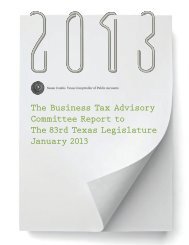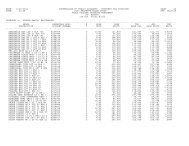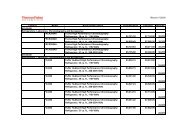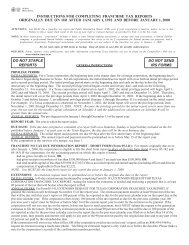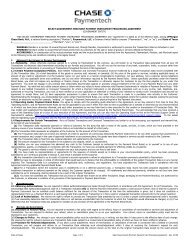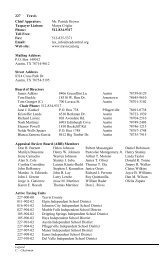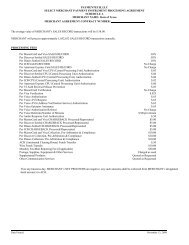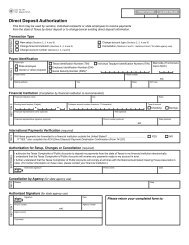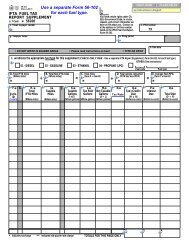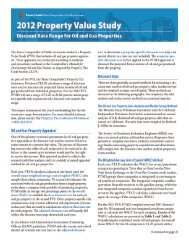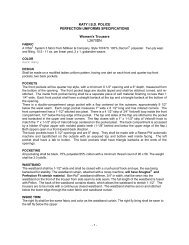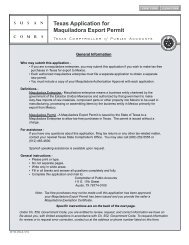Motor Vehicle Tax Guidebook 2011 - Texas Comptroller of Public ...
Motor Vehicle Tax Guidebook 2011 - Texas Comptroller of Public ...
Motor Vehicle Tax Guidebook 2011 - Texas Comptroller of Public ...
Create successful ePaper yourself
Turn your PDF publications into a flip-book with our unique Google optimized e-Paper software.
• reimbursement charges for the dealer’s vehicle<br />
inventory tax, if separately stated;<br />
• charge for debt cancellation agreement.<br />
Substitution <strong>of</strong> Collateral or<br />
Transfer <strong>of</strong> Equity<br />
Sometimes a person purchases a motor vehicle but<br />
retains the same loan that applied to a previously<br />
financed vehicle. The TAC should not accept a<br />
Form 130-U application indicating no tax is due<br />
because <strong>of</strong> a “substitution <strong>of</strong> collateral” or “transfer<br />
<strong>of</strong> equity”. The purchase <strong>of</strong> a vehicle is a taxable sale,<br />
whether or not an existing loan has a different vehicle<br />
associated with it as the collateral.<br />
Rebates<br />
Both manufacturer’s and dealer’s rebates passed directly<br />
to customers reduce the sales price when computing the<br />
taxable value <strong>of</strong> a motor vehicle.<br />
When a manufacturer provides a rebate to a selling<br />
dealer and the dealer passes the identifiable rebate—<br />
or any portion <strong>of</strong> it—to the customer, it should be<br />
considered a cash discount and deducted from the<br />
sales price.<br />
Liens<br />
When a lien is assumed and an amount is paid to the<br />
seller as equity, the sum <strong>of</strong> both amounts is the total<br />
taxable consideration. SPV may apply.<br />
When a lien is assumed and no equity is paid to the<br />
seller or lienholder, the amount to be paid to release<br />
the lien, commonly called “net pay<strong>of</strong>f,” is the total<br />
consideration for the sale. SPV may apply.<br />
Pro<strong>of</strong> <strong>of</strong> Total Consideration<br />
The selling dealer’s signature on the title application<br />
is an acceptable record <strong>of</strong> the sales price. The county<br />
TAC, however, can request the dealer’s invoice or sales<br />
receipt from the purchaser.<br />
For a private-party purchase <strong>of</strong> a used motor vehicle<br />
in <strong>Texas</strong> or from out <strong>of</strong> state for <strong>Texas</strong> use, the person<br />
applying for a certificate <strong>of</strong> title or registration for the<br />
motor vehicle must furnish the county TAC with a<br />
Form 130-U, which includes a joint statement signed<br />
by both the buyer and seller, attesting to the sales price<br />
information on the Form 130-U. If the county TAC<br />
has reason to question the truth or accuracy <strong>of</strong> the<br />
information, or if both parties to the transaction have<br />
not signed the form, the county TAC can require either<br />
party to furnish additional documentation about the<br />
motor vehicle’s sales price. For a motor vehicle acquired<br />
out <strong>of</strong> state, the person could provide a bill <strong>of</strong> sale<br />
signed by the seller.<br />
Purchase Price Not Available<br />
Sometimes a sale and change <strong>of</strong> possession take<br />
place, but the purchaser has not obtained a valid<br />
Form 130-U with the seller’s signature. If the seller’s<br />
signature is not on the Form 130-U, the purchaser<br />
must make a diligent effort to obtain it. Acceptable<br />
evidence <strong>of</strong> that diligent effort can take the form <strong>of</strong> a<br />
receipt obtained by sending a certified letter, return<br />
receipt requested, to the seller’s last known address.<br />
Other credible documentation may be accepted by the<br />
county TAC. If a motor vehicle is purchased out <strong>of</strong><br />
state, a seller’s signed bill <strong>of</strong> sale may be accepted in lieu<br />
<strong>of</strong> the seller’s signature on the 130-U.<br />
If, after making the necessary diligent effort, the<br />
purchaser has been unable to locate the seller to obtain<br />
the necessary signature on the Form 130-U application,<br />
the taxable value must still be established for the sale<br />
and may be determined in the following ways:<br />
Seller Is Known to be a Dealer<br />
• Use a seller-signed bill <strong>of</strong> sale.<br />
• If a signed bill <strong>of</strong> sale is not available, use the<br />
SPV value.<br />
• If the SPV value is not available, then require an<br />
appraisal from a dealer, insurance adjuster or at<br />
the discretion <strong>of</strong> the county TAC, someone who<br />
would have special knowledge <strong>of</strong> the vehicle’s<br />
value. Such a person may include an antique<br />
dealer or antique auction. The <strong>Comptroller</strong>’s<br />
appraisal form may be used, but is not required.<br />
In lieu <strong>of</strong> the appraisal, a title applicant who is<br />
obtaining a title through the bonded title process<br />
may use two-thirds <strong>of</strong> the bond amount (bond is<br />
for 150 percent <strong>of</strong> vehicle value).<br />
Seller Is Not a Dealer or is Unknown<br />
For a <strong>Motor</strong> <strong>Vehicle</strong> Fewer than 25 Years Old<br />
• Use the SPV procedure, which includes<br />
comparing the price to other documentation<br />
(e.g., bill <strong>of</strong> sale, canceled check), if available.<br />
• If the SPV is not available, require an appraisal<br />
on Form 14-128.<br />
III-26<br />
<strong>Motor</strong> <strong>Vehicle</strong> <strong>Tax</strong> <strong>Guidebook</strong>



